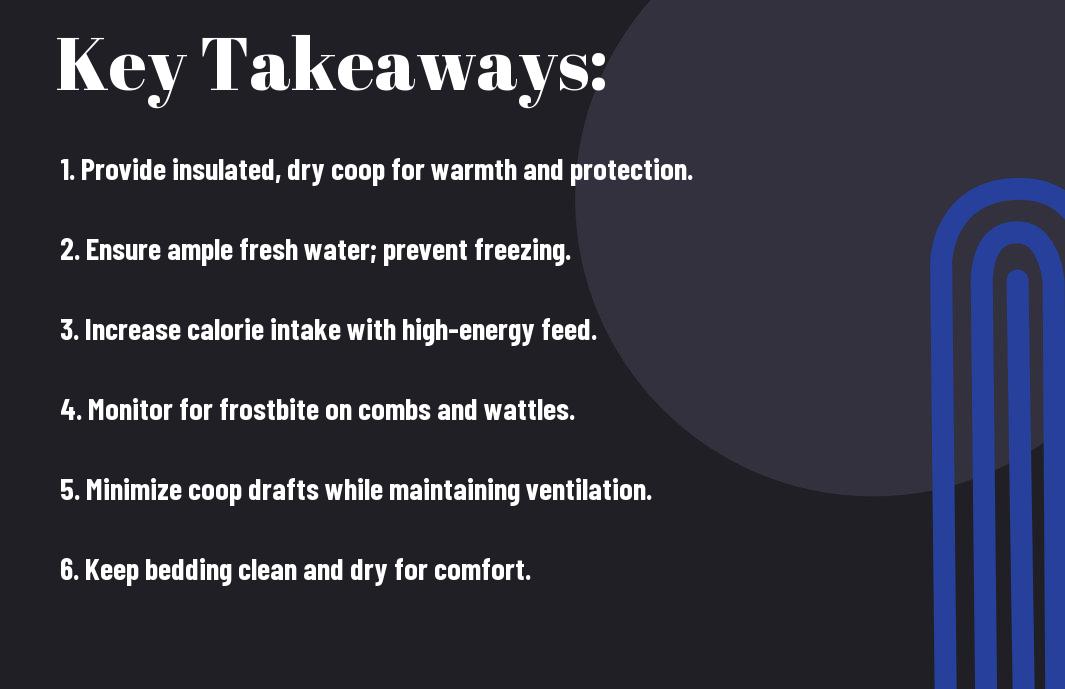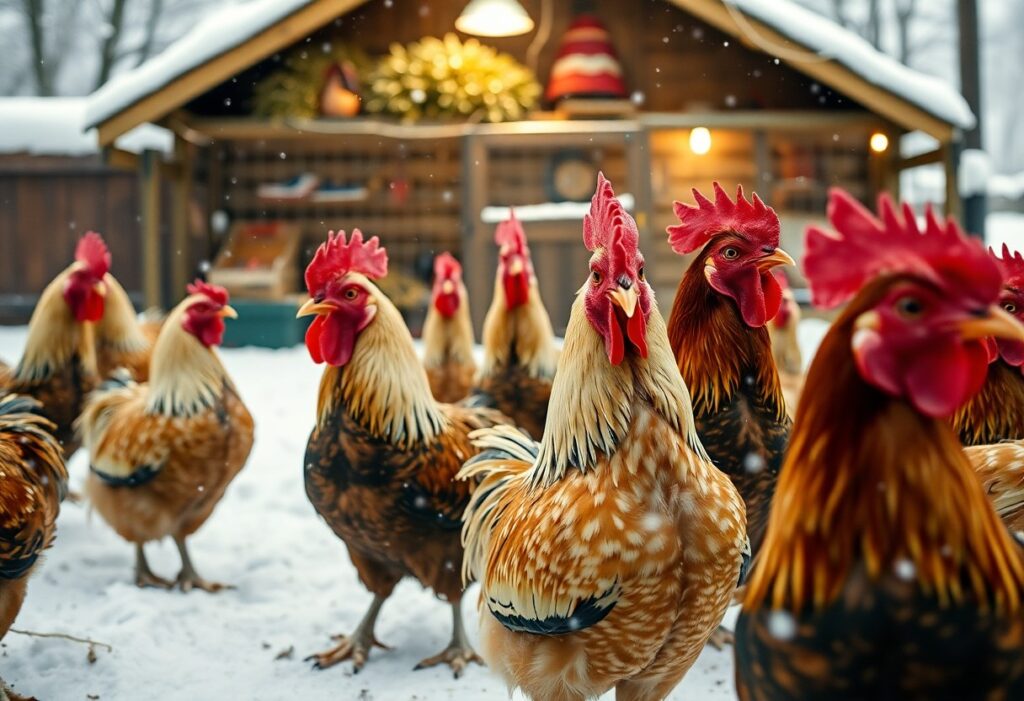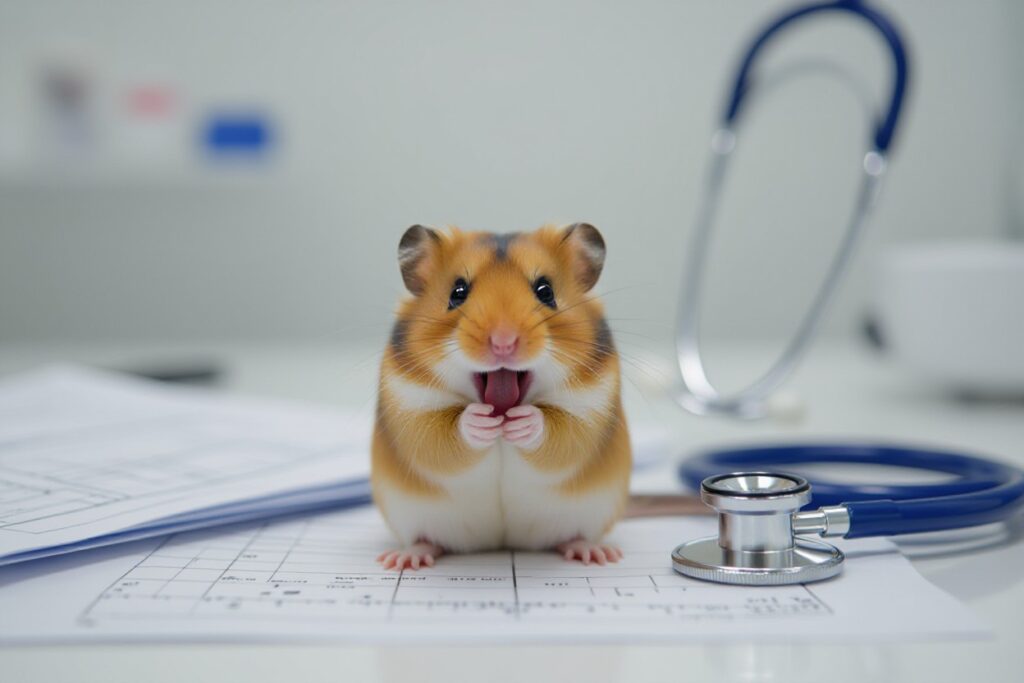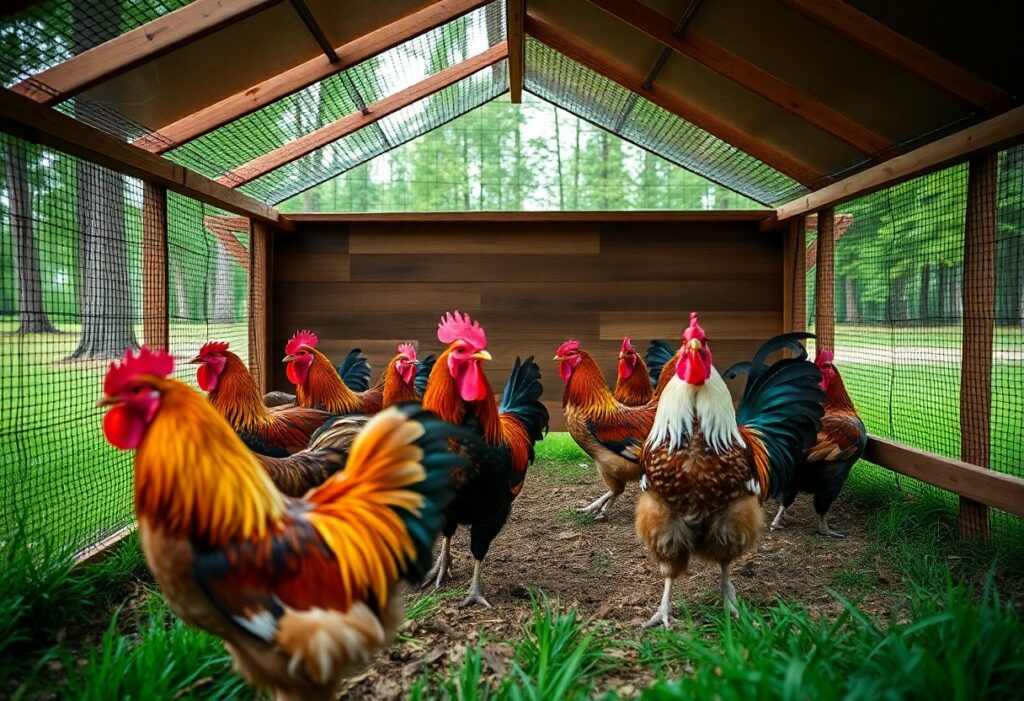Most chicken keepers underestimate the challenges winter presents for your roosters. The cold weather can lead to serious health issues, including frostbite and respiratory problems. To ensure your flock remains healthy and happy, it’s necessary to implement effective winter care strategies. In this post, you’ll learn how to protect your roosters from the harsh elements, maintain their comfort, and keep their living conditions safe during the colder months. You’ll be equipped with practical tips that can help your roosters thrive even in the chilliest of temperatures.
Key Takeaways:
- Provide adequate shelter to protect roosters from harsh winter elements, ensuring it’s draft-free and insulated.
- Monitor their diet, incorporating higher energy feeds to help maintain body heat during colder temperatures.
- Keep water containers from freezing, ensuring your flock has access to fresh water at all times to stay hydrated and healthy.

Understanding Rooster Physiology
To care for your roosters effectively during winter, it is necessary to understand their physiology. Roosters, like all chickens, have special adaptations to help them survive in various temperatures. They possess a unique feather structure, a layer of body fat, and specific behaviors that enable them to manage cold weather. By understanding these physiological traits, you can provide better care and ensure your flock remains healthy throughout the winter months.
Temperature Regulation
About how roosters maintain their body temperature in cold weather:
| Physiological Feature | Function |
|---|---|
| Feathers | Insulate the body against cold temperatures |
| Body Fat | Provides energy reserves and insulation |
| Behavioral Adaptations | Seeking shelter and fluffing feathers for warmth |
Signs of Cold Stress
An effective way to monitor your flock’s health is by checking for signs of cold stress in your roosters. Watch for symptoms such as lethargy, ruffled feathers, and a huddled posture, which indicate they may be struggling to stay warm.
Due to the cold, roosters can experience severe health challenges. Monitor their behavior closely for any unusual signs. Weight loss, decreased activity, and changes in vocalizations are critical indicators of cold stress. It’s vital that you act quickly to alleviate their discomfort by providing appropriate shelter, bedding, and nutrition during harsh winter months. Your prompt attention can help prevent more serious health issues and keep your flock thriving.
Housing Requirements
Some key housing requirements can make a significant difference in keeping your roosters comfortable during winter. A well-built coop is imperative to protect your flock from cold winds and precipitation. Ensure that your coop provides enough space for each rooster to move around freely while minimizing stress, as overcrowding can lead to health issues. Proper insulation and ventilation will help maintain a stable and inviting environment for your birds throughout the chilly season.
Insulation and Ventilation
Ventilation is vital in chicken coops to prevent the buildup of moisture and harmful gases while retaining warmth. Make sure your coop has vents that can be adjusted based on the weather; this will keep the air fresh without creating drafts. Proper insulation, such as using straw bales or foam boards, will help maintain a comfortable temperature while shielding your roosters from the cold. Adequate airflow and insulation work together to create a healthy living space that keeps your flock warm and happy.
Flooring and Bedding Choices
Before choosing your coop’s flooring and bedding materials, it’s imperative to consider their impact on your roosters’ health and comfort. Opt for flooring that is easy to clean and provides excellent insulation, like wood or concrete with proper covering. For bedding, you should use straw, wood shavings, or shredded paper to help retain warmth and absorb moisture. Avoid materials like sand or dirt, as they can encourage dampness and exposure to cold.
Indeed, the choice of flooring and bedding not only contributes to your roosters’ comfort but also impacts their health. Proper bedding helps create a dry environment, minimizing the risk of diseases like respiratory infections or crop impaction. Keep in mind that soft bedding will allow your roosters to stay warm and could help them produce warmth through natural body heat. Regularly replacing the bedding ensures that your coop remains clean and hygienic, which is imperative for keeping your flock healthy during the winter months.
Nutrition and Diet Adjustments
Despite the cold weather, ensuring your roosters receive proper nutrition is imperative for maintaining their health and vitality during winter. Adjusting their diet can help them cope with the frigid temperatures, enabling them to produce more energy and stay warm. Incorporating nutritious foods and making specific dietary changes can greatly benefit your flock as they navigate the challenges of the season.
Increased Caloric Intake
Nutrition is key during winter months when your roosters require more energy to stay warm. Increasing their caloric intake through a diet rich in whole grains, seeds, and high-quality poultry feed will help your roosters maintain body heat. Additionally, consider offering warm mash or heated water to encourage consumption and optimize their energy levels.
Supplements for Winter Health
Beside adjusting their diet, providing supplements can help ensure your roosters remain healthy throughout winter. Vitamins, minerals, and probiotics can enhance their immune systems, improve digestion, and promote overall well-being.
The inclusion of supplements such as vitamin E and selenium is especially important as they can help prevent diseases related to cold stress and boost your roosters’ resilience. Adding a high-quality probiotic can also aid in maintaining gut health, which may be compromised due to varying winter diets. Opt for electrolyte solutions in their water to keep them hydrated and energized. Paying attention to these dietary needs helps you safeguard your roosters’ health during the harsh winter months.
Health Monitoring
Once again, your roosters’ health should be a priority during winter months. Regular health monitoring helps you detect potential issues early, ensuring that your flock remains robust and productive. Pay attention to their behavior, eating habits, and physical condition. This vigilance will enable you to respond promptly to any health concerns that may arise as the temperature drops.
Regular Check-ups and Observations
After winter sets in, it’s important to perform regular check-ups on your roosters. Frequent examination of their feathers, combs, and wattles can help you spot signs of frostbite or other health issues. Take note of any changes in their activity levels and make sure they continue to eat and drink adequately to maintain their energy and health.
Common Winter Ailments
Common ailments you might encounter during winter include respiratory issues, frostbite, and colds. These conditions can negatively impact your birds’ health if left untreated. Keeping a close eye on your flock allows you to address these problems before they escalate.
Observations during winter should include checking for signs of respiratory distress, such as coughing and wheezing, which may indicate infectious bronchitis or infectious laryngotracheitis. Ensure to look for frostbite on exposed skin areas, especially around the comb and wattles, as this can lead to severe pain and infection. Maintaining a dry and draft-free environment will also help prevent many cold-related ailments. Keeping a detailed health log can facilitate early detection of any changes in behavior or signs of illness in your flock.
Social Dynamics in Cold Weather
Many factors affect the social dynamics of your flock during the winter months. Cold weather can intensify stress among your chickens, leading to changes in behavior and interactions. You must monitor their social structure closely, as winter can exacerbate issues related to competition for resources such as food, warmth, and space. Keeping an eye on your roosters’ interactions will help maintain harmony within your flock and ensures their overall health and wellbeing during this challenging season.
Pecking Order Resilience
Among your flock, the pecking order is vital in establishing social structure and reducing conflict. As temperatures drop, roosters may be more susceptible to disruption in this hierarchy, which can lead to challenges as they vie for dominance. Ensure your flock has enough space and resources so that each rooster can establish a comfortable and stable position, promoting resilience within the pecking order.
Managing Aggression
Against the backdrop of winter’s challenges, you may notice increased aggression among your roosters. This behavioral shift can stem from limited resources, stressed conditions, or territorial disputes within the coop. At this time, it is important to provide adequate food and ensure sufficient space for all your birds. Positioning feeders and water stations strategically helps reduce competition and minimizes aggressive behaviors. Additionally, be vigilant for signs of bullying or excessive fighting, and be ready to separate individuals if necessary to maintain order and promote a peaceful environment in your flock.
Protective Measures
After ensuring your roosters are well-fed and hydrated, it is vital to implement protective measures for their well-being during the harsh winter months. Adequate shelter is vital; ensure that your coop is well-insulated and free from drafts. Adding bedding such as straw or wood shavings can help retain heat. Regular monitoring of their health is also important, as this can help you catch any potential issues early, allowing your flock to thrive even in the coldest conditions.
Clothing and Accessories
Along with proper shelter, providing clothing and accessories can help keep your roosters warm. Chicken saddles or vests can offer some protection against the cold, while also preventing feather loss due to mating behaviors. Additionally, heated perches can provide a comfortable resting spot as temperatures drop. Always ensure any clothing is well-fitted to avoid restricting movement or causing injury.
Safe Outdoor Exposure
Before allowing your roosters outside, assess the weather conditions to ensure it’s safe for them to roam. If temperatures are too low or there are ice and snow, restrict outdoor access. It’s beneficial to create a sheltered outdoor space where they can enjoy fresh air without being overly exposed to the elements.
Another important aspect of safe outdoor exposure is ensuring that your roosters have access to sunlight during the day. Shorter daylight hours in winter can lead to depression and lethargy in your flock. If the ground is frozen or covered in snow, you may want to limit their time outside and provide an enriching environment within the coop. Keep watch for any signs of stress and adjust their outdoor access accordingly, so your roosters maintain optimal health during winter months.
To wrap up
With this in mind, ensuring your roosters remain healthy during the winter months requires a proactive approach to their care. By providing adequate shelter, proper nutrition, and attention to their social needs, you can greatly enhance their well-being amidst the cold. Keep their living environment dry and free from drafts to minimize stress and illness. By being attentive to your flock’s needs, you not only protect their health but also enrich your experience as a responsible caretaker.
Q: How can I ensure my rooster is warm enough during the winter months?
A: To keep your rooster warm during the winter, it’s important to provide a well-insulated coop. Start by checking for any drafts and seal gaps where cold air can enter. Use straw or wood shavings as bedding to add insulation and help retain warmth. Additionally, consider using heat lamps or heated pads specifically designed for animal use, but be cautious of fire hazards. Ensure your rooster is not exposed to wet conditions, as moisture can lead to chilling. Proper ventilation is also key, so ensure there is fresh air circulation without direct drafts.
Q: What should I feed my rooster in winter to keep him healthy?
A: In winter, roosters require a diet that provides adequate energy to maintain their body heat. You should focus on high-quality layer feed that is formulated for their nutritional needs, as it contains crucial vitamins and minerals. Supplement their diet with scratch grains, which can help increase caloric intake, or add oats, corn, or other grains. Additionally, providing access to greens, such as leafy vegetables, can enhance their diet. Always ensure fresh water is available, and consider warming the water in extreme cold to prevent freezing.
Q: How can I spot signs of illness in my rooster during winter?
A: Monitoring your rooster during the winter is important for catching any signs of illness early. Look for changes in behavior; lethargy, loss of appetite, or isolation from the flock can be indicators of health issues. Observe his feathers; ruffled or unkempt feathers can suggest stress or illness. Also, check for abnormal droppings, coughing, or nasal discharge, as these can be signs of respiratory issues. Regularly palpate his body to ensure he has proper weight and check for any signs of frostbite on combs and wattles. If you notice any behavioral or physical changes, consult a veterinarian specializing in poultry for further evaluation.










